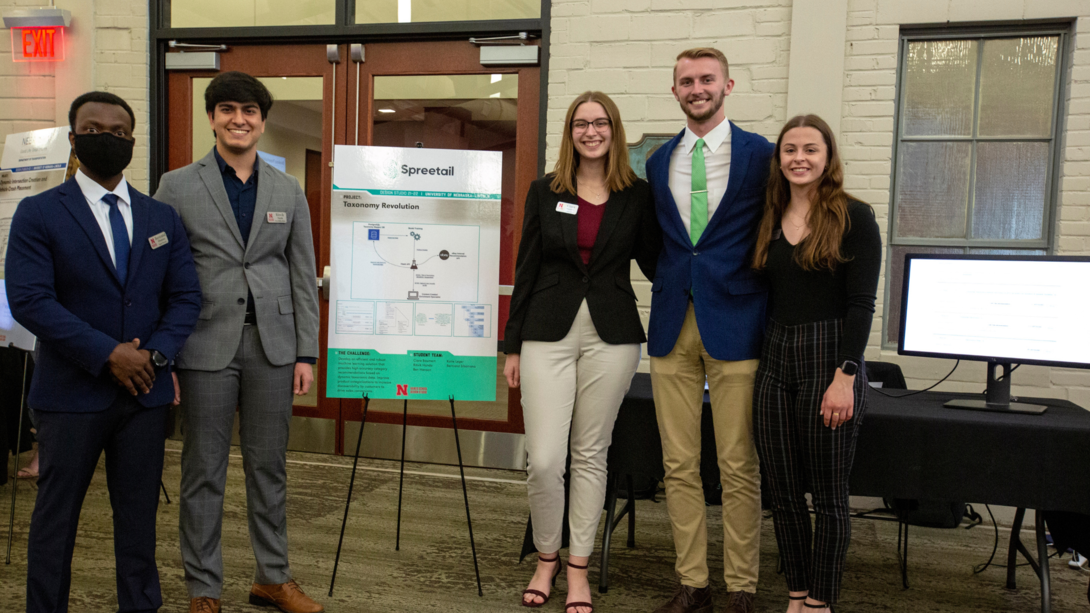
A team of five students in the Jeffrey S. Raikes School of Computer Science and Management’s Design Studio was asked to solve an E-commerce company’s categorization problem and produced a solution that saved 34,000 hours per year.
The design studio is a required, two-year capstone program in which students merge engineering, business and design to solve real-world problems with robust software products. Student teams are paired with local companies to create a product to solve a problem. Throughout the fall-to-spring process, students overcome challenges, hone their teamwork skills and are mentored by industry professionals while they develop an outstanding product.
The program culminates with the Design Studio Showcase, during which students present their products to community members and stakeholders. At the showcase, two teams are recognized for their dedication and exceptional projects with platinum and gold awards. This year’s winners were Team Spreetail and Team Bridges to Hope, respectively.
“Our team was already very proud of the work we had done, but it was really nice to also have external recognition,” said Ryan Olsen, Bridges to Hope team lead and product manager from Aurora, Colorado. “More than anything, it was meaningful to have the Bridges to Hope director see us getting the award because throughout the year, she kept saying how much this meant to her and how much she wanted us to be recognized.”
Olsen’s team worked with the program’s first nonprofit organization, Bridges to Hope. The nonprofit provides items and services to those transitioning into the community after incarceration. Currently, Bridges to Hope tracks items and services with pencil and paper. With financial support from Spreetail, the Raikes team developed a data management platform for the organization.

The website, accessible only to volunteers and employees of the organization, was built from scratch to replace the paper tracking system and gives the organization a way to track re-entrants and items. It also brings added abilities, such as generating data reports.
From this project, students learned more about usability, longevity, managing expectations and communicating. And, the worthy cause kept the students motivated throughout the year.
“I think the nonprofit aspect was the coolest part of the project,” said Ray Huck, team lead and development manager from Omaha. “It was cool to know that the community of Lincoln had a stake in what we were building.”
In addition to funding the Bridges to Hope project, Spreetail had its own problem that they posed to the students on Team Spreetail.
Spreetail has an internal dashboard that they currently use where they’ll input item information and then they can go through all the different marketplaces they sell on. Whoever’s listing the item can select whatever category they think is best.
“What our solution will end up looking like is there will be a button on that page where it says ‘get a category suggestion’ and it’ll use the information that’s already input about the item to run through our model and give them a prediction,” said Ben Hanson, team lead and development manager from Overland Park, Kan.
This solution saves time, labor and improves accuracy for product categorization.
“Originally, the process that they were using took about 20 minutes per product. We reduced that to about two minutes per product which is about a 90% reduction in time,” Leger said. “We figured out that that equates to about 34,000 hours per year of product catalog categorization time that they no longer need.”
According to Leger and Hanson, a 5% increase in the accuracy of the product categorizations could mean massive earnings for Spreetail, because those customers are able to find the products that they want to buy and are more likely to buy from them rather than a competitor. The team exceeded that goal, and increased the accuracy by 15%, which could have huge a impact on the company’s revenue.
To Team Spreetail, the platinum award validated the dedication and time spent perfecting their product.
These two award-winning projects gave the team leads and their team members the experience to further develop and showcase their skills in communication, design, usability and more.
The four leads, who graduated May 14, will take the lessons they learned to their future employers, which are Disney, Groupon, Buildertrend and PayIt.
“My career my goal is to one day become a team lead instead of just a software developer,” Hanson said. “This experience was my first real experience leading a software project, which will be really useful for my future.”







